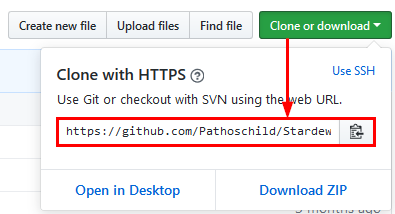Modding:Open source
Revision as of 00:04, 17 March 2019 by Pathoschild (talk | contribs) (split from Modding:Using XNB mods)
Go open-source
Common questions
- What is 'open source'?
- Open source means your mod's code is public and others can change a copy of it subject to a license you choose. You still have full control of your original code and mod pages; nobody can change those without your approval! However, open source lets others create unofficial updates or publish their own versions.
- Do I have to go open-source?
- No, but it's strongly recommended. Making mods open-source is important for the long-term health of the modding community — when you're away or lose interest, others can still update your mods for the latest versions. 66% of SMAPI mods have source code available, which contributes to over 90% of tracked SMAPI mods being updated after major game updates.
- What is Git? What's a repository?
- Git is software that helps track changes to your code, and a repository is a folder containing your mod files plus special files for Git tracking. You don't really need to know how it works at this point; we'll walk you through getting your code up and making changes (and you can look up Git tutorials if you want to dig deeper).
- Doesn't this only apply for SMAPI mods?
- Nope! Although content packs aren't compiled, other modders can't legally make changes without a code license. Note that 'permissions' options on sites like Nexus are legally iffy (e.g. who has copyright on derivatives? Can derivatives be relicensed?), so it's a good idea to have a code license for content packs too. That also lets other modders contribute pull requests and updates.
First-time setup
This looks like a lot of steps, but don't worry: it's pretty straightforward. If you need help, come ask in #modding on the Stardew Valley Discord. :)
Create the Git repository
First, let's create the public repository which will contain your code.
- Create a GitHub account.
- Install SourceTree (Mac/Windows) or GitKraken (Linux). When asked, link it to your GitHub account.
- Create the repository on GitHub.
Suggested settings (see screenshot):
- Repository name: consider StardewMods if you'll put all your mods in the same repository, otherwise use the name of your mod.
- Description: consider Mods for Stardew Valley.
- Initialize ... with a README: enable this option.
- Add .gitignore: leave this blank; we'll add our own later.
- Add a license: choose a license (MIT License is a good choice if you're undecided), and select it here.
- Click 'Create repository'.
- On the repository page that appears, click the green "Clone or download" button and copy the URL:

- In SourceTree, click File > Clone and paste the URL. Choose a destination path that's easy to access (like C:\source\StardewMods), and click 'Clone'.
That's the hard part done! Now you have a repository on GitHub that's synced with the folder on your computer.
Add the mod files
Next, let's add your files to the repository.
- Open the repository folder (the destination path you entered in step 5 above).
- Unzip this zip file into the folder. This will add two files to the root of your folder: .gitattributes (which normalises line endings between Linux/Mac/Windows) and .gitignore (which hides files which shouldn't be committed from Git). You just need to have them in your folder, you won't need to change them.
- Copy your mod files (including the .sln file) into the folder.
- Commit your changes in SourceTree:
- Click Commit at the top.
- Click Stage All to add the files to your commit.
- Enter a human-readable description for you changes in the textbox. The format is up to you, but "add initial mod files" is fine for now.
- Make sure "Push changes immediately" is ticked.
- Click "Commit".
That's it: all your files will appear on GitHub. Your mod is now open-source!